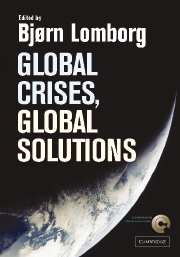Book contents
- Frontmatter
- Contents
- List of figures
- List of tables
- List of boxes
- List of contributors
- Acknowledgements
- List of abbreviations and acronyms
- Introduction
- PART I THE CHALLENGES
- 1 Climate change
- 2 Communicable diseases
- 3 Conflicts
- 4 Access to education
- 5 Financial instability
- 6 Governance and corruption
- 7 Malnutrition and hunger
- 8 Migration
- 9 Sanitation and access to clean water
- 10 Subsidies and trade barriers
- PART II RANKING THE OPPORTUNITIES
4 - Access to education
Published online by Cambridge University Press: 22 September 2009
- Frontmatter
- Contents
- List of figures
- List of tables
- List of boxes
- List of contributors
- Acknowledgements
- List of abbreviations and acronyms
- Introduction
- PART I THE CHALLENGES
- 1 Climate change
- 2 Communicable diseases
- 3 Conflicts
- 4 Access to education
- 5 Financial instability
- 6 Governance and corruption
- 7 Malnutrition and hunger
- 8 Migration
- 9 Sanitation and access to clean water
- 10 Subsidies and trade barriers
- PART II RANKING THE OPPORTUNITIES
Summary
Introduction
This chapter is part of the Copenhagen Consensus process, which aims to assess and evaluate the opportunities available to address the ten largest challenges facing the world. One of these ten challenges is the ‘lack of education’. As a challenge paper this chapter intends to:
Describe the scope of the global challenge of ‘lack of education’ in enrolments, attainments and learning achievement
Provide an analytical framework for assessing opportunities to address this challenge
Review the existing literature to produce estimates of the costs and benefits of five classes of feasible opportunities for addressing this challenge.
As grappling with this Herculean task in the limited space available leads to an extremely dense document, I want to highlight the main conclusions up front, and in particular stress how they differ from (at least some strains of) the current international conventional wisdom:
Scope
Defining the scope of the problem of ‘lack of education’ must begin with the objectives of education – which is to equip people with the range of competencies (which includes both cognitive and non-cognitive skills, knowledge and attitudes) necessary to lead productive, fulfilling lives fully integrated into their societies and communities. Many of the international goals are framed exclusively as targets for universal enrolments or universal completion. But getting and keeping children ‘in school’ is merely a means to the more fundamental objectives and while schooling is necessary, it is by no means sufficient.
- Type
- Chapter
- Information
- Global Crises, Global Solutions , pp. 175 - 250Publisher: Cambridge University PressPrint publication year: 2004
- 26
- Cited by

